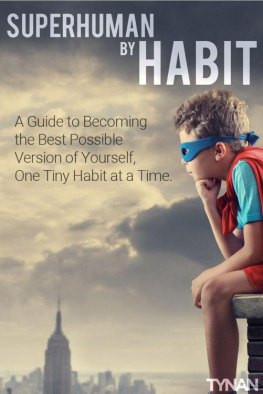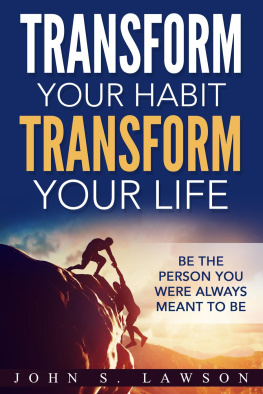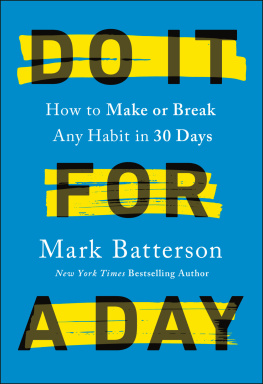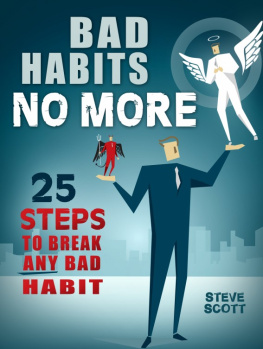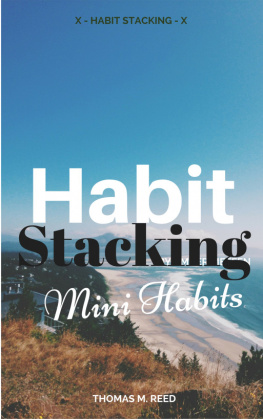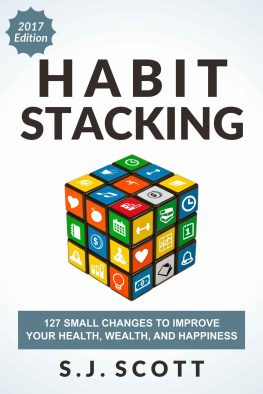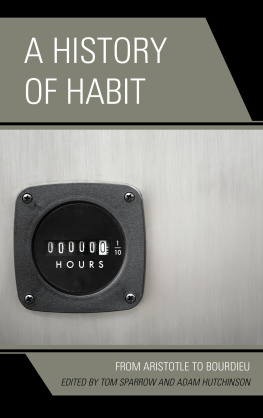Dedicated to my mother, who gave this book
the most thorough proof-reading imaginable
(and also gave birth to me a while back).
Introduction
If you were to tell my friends and family ten years ago that I would write a book on habits, they would have laughed. Though I never had any truly destructive habits like using drugs, my everyday habits surrounding productivity and self improvement were abysmal. Even if I had wanted to write such a book, my work habits were so poor that it could have never been completed.
In my late twenties the illusion of invincibility and goals being reached simply because I wanted them began to wash away. If I was going to reach my goals, something would have to change.
I went to sleep at random hours late at night, and woke up in the mid-afternoon. My vehicle registrations and inspections were always delinquent, sometimes by years. I was consistently late to almost everything. The lengths of time by which I procrastinated on important things could be measured in weeks or months. I had half a dozen projects started, none with any real prospect of being finished.
It was obvious to anyone, even myself, that what needed to change was my habits.
Fortunately I have one trait that rescued me from this abyss of bad habits: when I jump into something, I jump in headfirst and give it everything I've got. I decided that if I was going to tackle habit change, I wouldn't stop until I had mastered it.
I read a lot of books on habit change to understand the underlying mechanics, but more importantly, I experimented on myself relentlessly. Most habit books seemed to be written only for middle aged businessmen, not young ambitious people with a willingness to push themselves. As I learned more about habits and became more adept at building them, I wanted to push the bounds of determination, willpower, and habit-building.
My only fear was that my life would become too boring if I had this underlying structure of habits. I was willing to accept this trade-off, though, only because I needed good habits so desperately. What surprised me was the freedom which habits gave me. Rather than making me feel like a robot running through routines, building habits has made so much of my life automatic that it feels like I have complete autonomy because I don't have to worry about the basics. They get done in the background.
It doesn't always feel like it, but these days my life is dictated by the habits I've created. When people learn that I write every single day, study a foreign language every day, work on my big projects every day, eat healthy every day, work out every other day, and maintain a consistent sleep schedule, they marvel at the deep well of self discipline that I have. In truth, though, it's all just habits that feel easy. Habits are the closest we can get to having superpowers.
This book is a collection of the mindsets and techniques I've used to rebuild myself with habits. If, like I used to be, you can barely stay on top of the essentials of day-to-day living, this book is for you. If
you perform well, but are inconsistent, this book is for you. Or if you're a self-optimizer who already performs at a high level, but wants to squeeze even more out of himself, this book is for you.
BUILDING HABITS
What is a habit, and why are habits so important?
A habit is an outfit a nun wears.
Also, it's an action that you take on a repeated basis with little or no required effort or thought. The power of a habit lies in the second part of that definition-- the bit about no required effort or thought. It's a loophole that allows you to upgrade your health, quality of life, productivity, and enjoyment of the world with a fixed expenditure of energy in creating a habit, rather than on an ongoing drain on your willpower.
This is the engine that drives the people we most admire: those people who consistently seem to excel at their work, stay healthy, stay connected to those around them, and do all of this while remaining calm and happy. The easy explanation for their success is to say that they're somehow built differently or better than the rest of us, but if they are, it's only because of one key thing: they are better at building and sustaining new habits.
The difference could be represented using a bank account as a metaphor. Those who build habits are like people who live below their means, slowly building up an impressive balance in their bank account. When expenses come up or their situation changes, they're able to cope with it effortlessly by accessing the past deposits (and interest) in their account.
On the other hand, there are people who live paycheck to paycheck. They never seem to be able to get ahead and every expense is a stretch.
In the short term, the person who lives paycheck to paycheck may not envy the other guy so much. After all, he gets to spend his whole paycheck every week, while the saver seems to be enduring hardship for some unknown purpose.
As time goes on, of course, the saver's position becomes better and better, while the spender's gets worse.
Although it is possible to build your willpower capacity, we all have a limited amount. One who builds habits channels all of his excess willpower to building habits, which pays off later because he's able to sustain those habits without using any additional willpower. On the other hand, some people never build habits, ensuring that they must always rely on available willpower to do anything. This works fine sometimes, but as soon as they're tired or hungry or overworked, everything crumbles.
Don't Spend Your Willpower, Invest It
The glorious benefit of a habit is that it converts something that requires a lot of w illpower and focus into something that becomes automatic and often outside of our conscious thought. We can consciously push ourselves to do a only a certain amount of things every day, which means that if we don't have good habits, there is an ceiling to what we can accomplish, personally and a professionally. This limit is not particularly high, and is probably not high enough to achieve our goals and live the life we want.
By creating habits, we can move things from the hard category to the easy category, thus freeing up willpower to tackle more of the hard things. We don't give ourselves the ability to accomplish more by sacrificing health and sanity, which causes burnout, but rather by making some of those hard things easy.
If the idea of being hyper-productive, being physically active and eating right, building good relationships with those around us, learning things that interest us, all while keeping yourself positive and fulfilled seems difficult, it's only because you haven't switched enough of those deliberate actions and attitudes to automatic habits. This takes effort, but establishing most habits takes the relatively short time of one to twelve months.
You Already Have A Million Habits
Saying that we're building habits is a bit of a misnomer. In reality, we are all creatures of habit by design. The vast majority of our daily actions are actually dictated by our subconscious through habits.
Did you brush your teeth this morning? If so, it was because you've built that habit, not because you took fifteen minutes this morning to carefully weigh the pros and cons of dental hygiene. If you procrastinated today, it's because you've built the habit of procrastinating.
Even your outlook on life is the product of your habits. You either have the habit of seeing the positive side of things or the negative side of things, and this single pattern will dominate your mood for the rest of your life. The number of friends you have, and even how much strangers like you upon meeting you, are all the products of habits. Most of our actions stem from subconscious impulse, and those subconscious impulses are the product of our habits.
Next page
